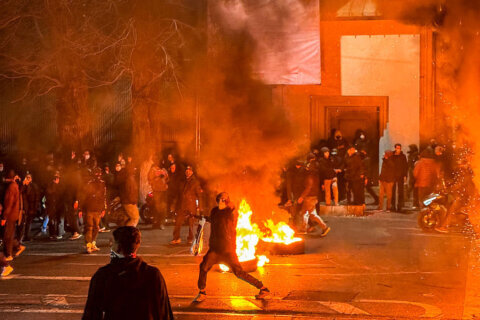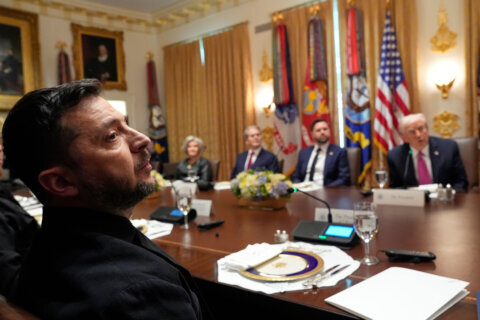WASHINGTON — A top Iraqi diplomat is warning the West has been too slow to address the global crisis presented by the Islamic State, and may soon have to pay a heavy cost.
Lukman Faily, Iraq’s Ambassador to the U.S., told WTOP in an exclusive interview that while the west is intellectualizing ISIL — a phenomenon he likens to global warming — Iraq’s ancient heritage, its culture and the rest of the world’s security is being devoured by the Islamic State of Iraq and the Levant’s (ISIL, ISIS) violent ideology.
“We have over 30 car bombs a month. What type of society can put up with that,” he asked.
Faily suggested some influential people in the U.S. and beyond have not been willing to deal with the power “of the cancer that ISIS is.”
“You had one Bin Laden in Afghanistan, but now you will have thousands like Bin Laden (fighting) with ISIS all over the world. People say the homeland is not threatened and therefore this is not our problem. This is a regional problem. This is not helpful for the U.S. or Iraq moving forward,” Faily said.
Acknowledging Iraq is largely responsible for rise of ISIL, Faily said the proliferation of the group’s violent ideology is not an internal Iraqi problem.
“Granted, we have our own political, social and economic problems which in part led to this, I give you that. But the majority of the jihadists came over from Syria, while other countries allowed them to come over from Syria.”
“We are the frontlines, we need help and we are asking other countries is why would you let them (ISIL) have breathing space,” Faily said.
More than 40 countries have joined the fight against ISIL since July of 2014, including a U.S. led coalition comprised of many of Iraq’s regional neighbors, but there is concern the group is rapidly spreading beyond the region. Former Central Intelligence Agency director Michael V. Hayden told WTOP ISIL is a direct threat right now to the homeland.
“We’ve seen ISIS-inspired fighters attack in Europe, in North America and we’ve seen them attack in Australia,” said Hayden.
Hayden suggests Americans need to take a broader view of the threat.
“Even if you put the threat to North America aside, a radical Islamic state the size of Belgium, straddling the traditional trade routes of the Middle East is a threat of everyone on the planet and a threat that we cannot just let pass,” Hayden said.
A retired Air Force General, Hayden rejects complaints of combat fatigue in the United States.
“I share in that in my own way, but that said, this is a pay now or later.”
ISIL’s 15- ton bombs in Ramadi were ‘an innovation’
On May 17, Ramadi, a highly strategic location on the Euphrates River and the road west into Syria and Jordan, fell to ISIL after 28 suicide car bombs were detonated over three days.
Among them were at least seven enormous 15-ton armored truck bombs, detonated in a single attack.
“The phenomenon of these massive, armored, vehicle-born improvised explosive devices (IED) we saw used to such a devastating effect in the fall of Ramadi, was an innovation. It was adaptation by ISIL on the battlefield in order to inflict huge, significant, debilitating causalities on the Iraqi Security Forces to press their battle field advantage,” said Alistair Baskey, National Security Council spokesperson.
Baskey said U.S. officials took note of ISIL’s adjustment and made one of its own.
“Once we saw that happening, we fast shipped AT4 anti-tank missiles to the Iraqis. They arrived and are now deployable in the battle space,” Baskey said.
Two-thousand of the weapons arrived the week of June 1, 2015.
According to a U.S. Army website, the M136 ATF is a recoilless (shoulder-fired) rifle used to defeat armored threats. It fires an 84mm high explosive, anti-tank warhead which causes catastrophic damage after the warhead enters the target.
Also, Faily said ISIL’s battlefield prowess requires “a higher degree of airstrike targeting and accuracy.”
“The U.S. government has said that 75 percent of current ISIL IED payloads after leaving to attack targets return without deploying those payloads, which means that the percentage of target hitting isn’t that high – so some work has to be done,” Faily said.
Black market, rich Gulf donors filling ISIL’s coffers
In July of 2014, ISIL controlled almost a dozen oil fields in Iraq and Syria and made close to $3 million per day selling oil on the black market. The oil was pumped out, loaded onto large tanker trucks and moved by smugglers to refineries where middle men sold it on the black market in Turkey and beyond.
U.S. Treasury Assistant Secretary for Terrorist Financing Daniel Glaser told WTOP that number has been trimmed to “a couple million a week.”
But while ISIL has lost key oil revenue, Faily said wealthy figures in the region are giving millions to ISIL.
“You also have funds coming from the Gulf countries where you have emirs and royals who give money away to these organizations,” Faily said.
Faily said the process began after the birth of the global jihad movement in Afghanistan in the 1990s and spread to other locations. The U.S. State Department has identified Kuwait and Qatar as countries of concern when it comes to jihadist fundraising.
Faily said, however, Gulf state governments are not involved in the donations, but “individuals are being allowed to give substantial amounts of money through the Hawala system and other black market methods to these organizations.”
The U.S. Treasury says the Hawala works by transferring money without actually moving it. It’s based on an informal network of money lenders, who take requests from fellow brokers abroad to make money transfers in their country. It’s based on an honor system where brokers use their own funds to make the transaction and trust their network partners to repay them. The system is effective in jihadist fundraising because there no documents attached to the transactions.
Iraq may not survive intact
Faily said ISIL may eventually be defeated, but it’s demonstrated what an intelligent, violent and motivated terror organization can do, by seeping into the fissures of a weak country and exploiting its vulnerabilities.
“The survival of Iraq will depend on how much we are willing to forget our small issues for the sake of the big country. It will all depend on how much true support and true urgency the region and the world demonstrate,” Faily said.
ISIL is believed to have more than 30,000 fighters and supporters on the ground in Iraq and Syria who come from more than 50 countries, including the U.S.








